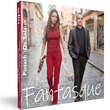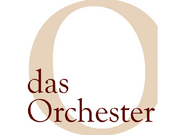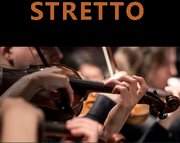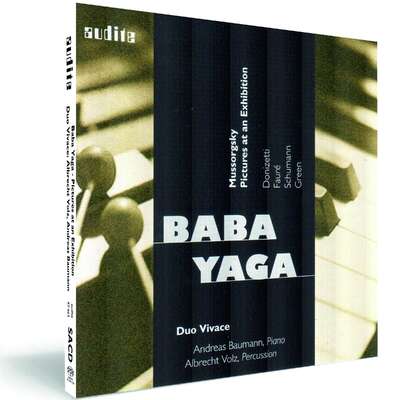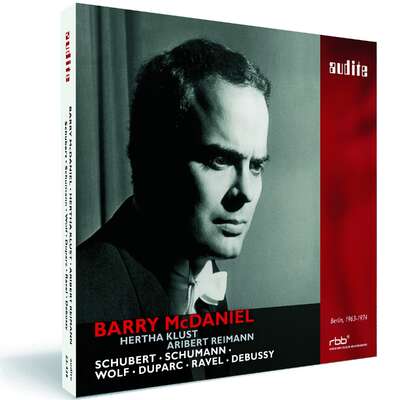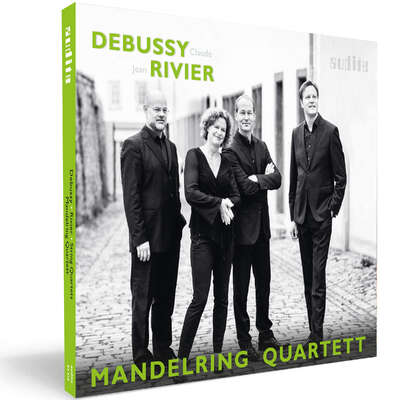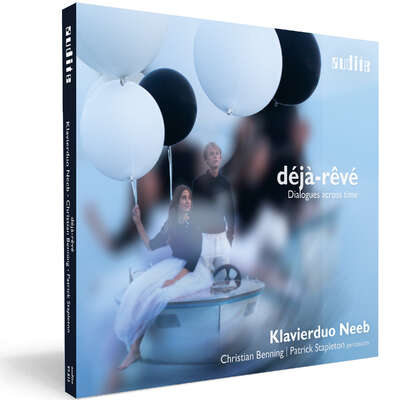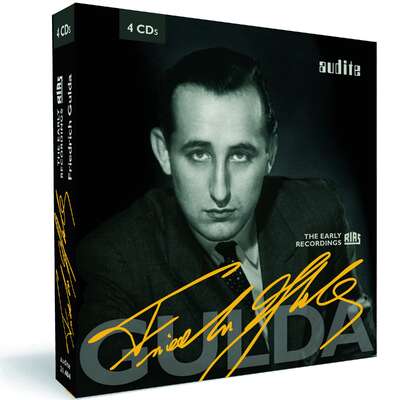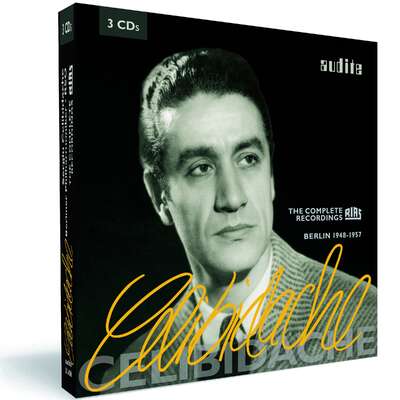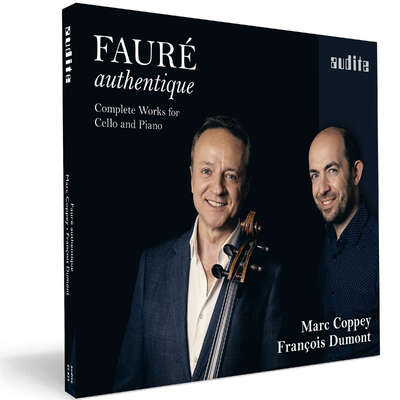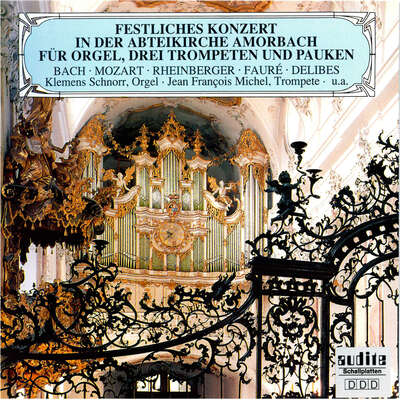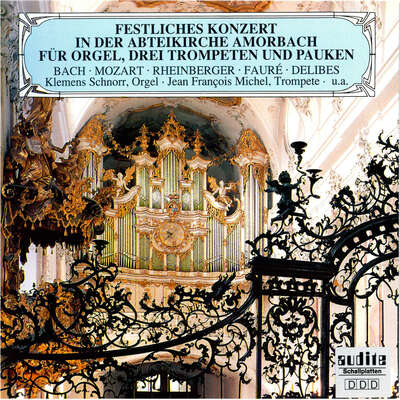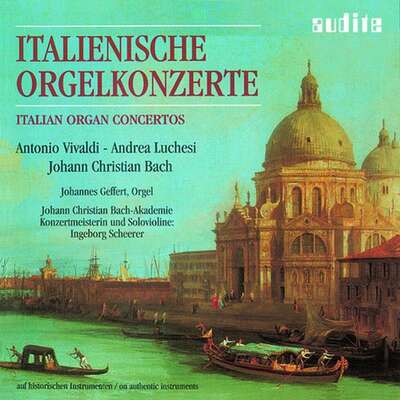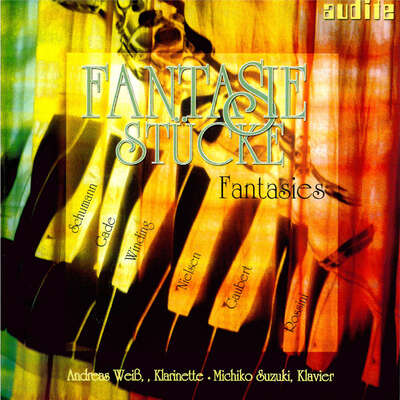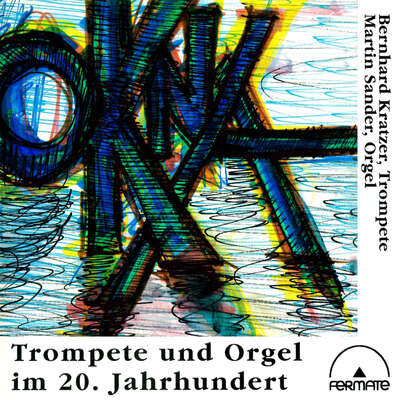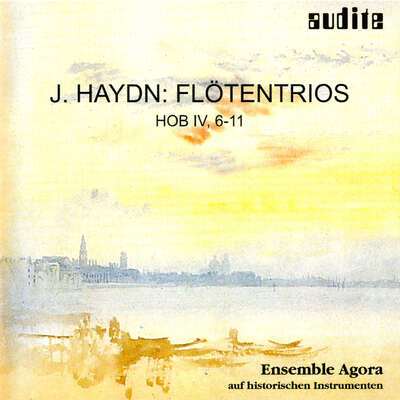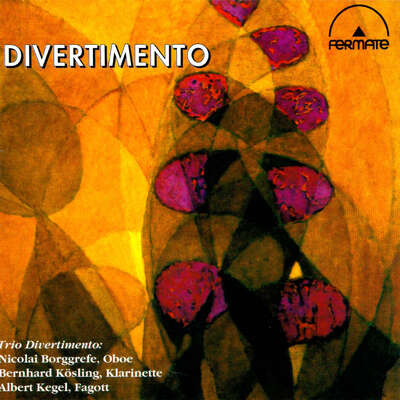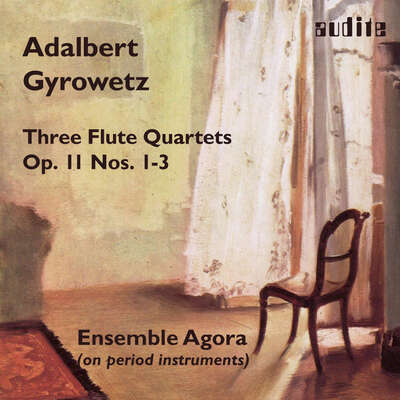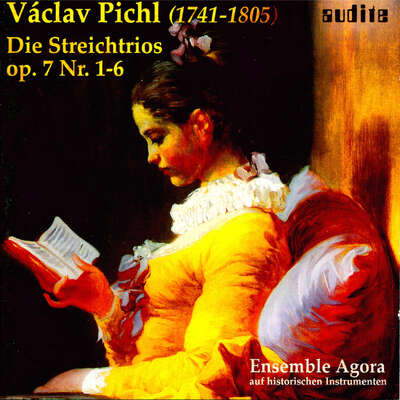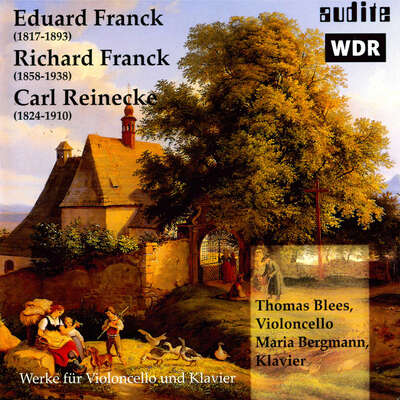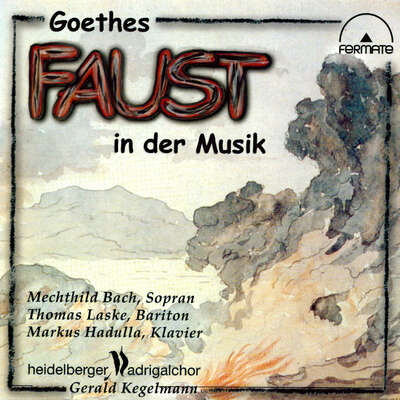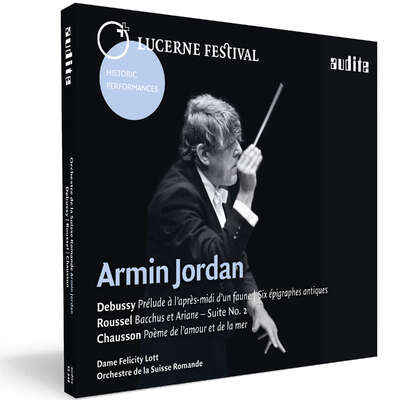
Auto-Rip
Franziska Pietsch und Josu De Solaun setzen ihre fesselnde Zusammenarbeit mit der Einspielung französischer Violinsonaten fort. Von Faurés nostalgischer Finesse zu Debussys aphoristischen Träumen, von Ravels vielschichtiger Weltgewandtheit zu Poulencs sarkastischem Humor und tiefempfundener Sinnlichkeit: Über fast 70 Jahre entstanden, entführt die Musik den Hörer in das Land der „fantasquen“ Magie, den Ort des Wundersamen und Bizarren, des Eigenwilligen und bittersüß Nostalgischen, des Facettenreichen und Humorvollen – und sogar des anrührend Tragischen.mehr
"Mit diesem Kaleidoskop an Emotionen ziehen die Interpreten in den Bann. Phrasen und melodische Linien erscheinen immer bewusst und liebevoll ausmodelliert. Eloquent, mitteilsam in bezwingender musikalischer Logik." (Fono Forum)
Titelliste
Diesen Bonustrack erhalten Sie ausschließlich als Download!
Details
| Fantasque - French Violin Sonatas by Fauré, Debussy, Ravel & Poulenc | |
| Artikelnummer: | 97.751 |
|---|---|
| EAN-Code: | 4022143977519 |
| Preisgruppe: | BCA |
| Veröffentlichungsdatum: | 8. Mai 2020 |
| Spielzeit: | 82 min. |
Zusatzmaterial
Informationen
Reale Erfahrungen und Emotionen spiegeln sich in einer visionären Traumwelt, die äußere Wirklichkeit findet ihren Widerhall im Innenleben. Die inneren Emotionen und Bilder werden durch die Musik klanglich wiederum Wirklichkeit und lösen neue Emotionen aus, Traum und Wirklichkeit spiegeln sich gegenseitig. Fauré, Debussy, Ravel und Poulenc erschaffen diese „Spiegelwelt" auf unterschiedlichste Weise. Der verbindende rote Faden ist das Fantastische, die Magie der Vorstellung, die poetische Distanz zur Wirklichkeit und die intensive Hinwendung zur inneren Emotion. So wird die Traumwelt zum Rückzugsort - für den Hörer und für die Künstler.
Besprechungen
Classica – le meilleur de la musique classique & de la hi-fi | N° 231 - Avril 2021 | Jacques Bonnaure | 1. April 2021
[...] la sonorité de Franziska Pietsch, magnifique, et le travail de Josu De Solaun, d'une clarté polyphonique absolue, servent une réalisation parfois discutable mais à laquelle on ne reste pas indifférent.Mehr lesen
International Classical Music Awards | 20.01.2021 | 20. Januar 2021 | Quelle: https://www.icma... ICMA WINNER 2021 "CHAMBER MUSIC"
From La Belle Époque to the years of World War II, the violin sonatas on this CD reflect the moods and whims of fast-changing times. FranziskaMehr lesen
Fono Forum | Januar 2021 | Andreas Friesenhagen, Norbert Hornig, Matthias Kornemann | 1. Januar 2021
Kritiker-Umfrage 2020
Welche fünf CDs haben Sie im vergangenen Jahr am meisten beeindruckt?
Andreas Friesenhagen: Liszt: Gante-Symphonie, Tasso, Lamento e Trionfo, Künstlerfestzug; Staatskapelle Weimar, Kirill Karabits (Audite).<br /> „KirillMehr lesen
„Kirill Karabits stellt Liszt mit herrlichen Orchesterfarben und leuchtender Textur als Klangzauberer dar, als Poeten des Orchesters.“
Norbert Hornig: Fantasque- Violinsonaten von Faure, Debussy, Ravel & Poulenc; Franziska Pietsch, Josu de Solaun (Audite).
„Hoch expressive und eloquente Lesarten zentraler Werke des französischen Repertoires für Violine und Klavier.“
Matthias Kornemann: Schubert: Klaviersonate D. 960, Klavierstücke D. 946; Andrea Lucchesini (Audite).
„Lucchesinis Schubert-Spiel ist von einer fast altmeisterlichen Gelassenheit und steht mit seiner nobel untertreibenden Gestaltungskraft ziemlich einsam da.“
„Kirill
Das Orchester | 12/2020 | Stefan Drees | 1. Dezember 2020 | Quelle: https://dasorche...
In musikalischer Hinsicht [stimmt] einfach alles. Das individuelle Können beider Partner bietet die Grundlage für ein ausgewogenes, klanglich durchdachtes Zusammenspiel, das auch dort voller feiner Details und unerwarteter Wendungen steckt, wo man die Musik eigentlich zu kennen glaubt.Mehr lesen
Musica | n° 321 - novembre 2020 | Stefano Pagliantini | 1. November 2020
[...] i due interpreti riescono ad offrirne un’interpretazione di notevole profondità, di lucida acutezza e di trascinante forza. Un CD che si ascolta con grande soddisfazione e che ci pare tra i migliori usciti negli ultimi tempi dedicati a questo repertorio.Mehr lesen
Fono Forum | November 2020 | Norbert Hornig | 1. November 2020
Schwärmen, Erzählen, Farben leuchten lassen. Franziska Pietsch und ihr spanischer Klavierpartner Josu de Solaun sind auch in ihrer zweitenMehr lesen
Gabriel Faurés erste Sonate blüht gleich zu Beginn auf in spätromantischem Überschwang, Claude Debussys Musik entfaltet ihre atmosphärische Sogkraft, bei Ravel flirren die Farben, im zweiten Satz, "Blues", reizt der laszive Unterton, das insistierende "Perpetuum mobile" taumelt atemlos dem Schluss entgegen. In Francis Poulencs Gefühlslabyrinth wird einem dann heiß und kalt zugleich. Mit diesem Kaleidoskop an Emotionen ziehen die Interpreten in den Bann. Phrasen und melodische Linien erscheinen immer bewusst und liebevoll ausmodelliert. Eloquent, mitteilsam in bezwingender musikalischer Logik.
So wird die CD ihrem Titel "Fantasque" vollends gerecht. Auch akustisch erfüllt die Aufnahme höchste Ansprüche. Sie entstand in der Jesus-Christus-Kirche in Berlin-Dahlem, die nicht zuletzt wegen ihrer optimalen Nachhallverhältnisse ein begehrter Ort für Tonaufnahmen ist. Der Klang wirkt sehr natürlich und die Balance zwischen den Instrumenten stimmig.
American Record Guide | September 2020 | Joseph Magil | 1. September 2020
Franziska Pietsch is one of the few musicians whose releases I eagerly anticipate. She is a very individual artist, one of the few with a recognizableMehr lesen
Neue Musikzeitung | Jg. 69 - Nr. 9/2020 | Hanspeter Krellmann | 1. September 2020 | Quelle: https://www.nmz.... unüberhörbar
„Fantasque“ charakterisiert die vier Sonaten und ihre überzeugend geschlossene Wiedergabe. Denn so „wunderbar“ wie „phantastisch“ durchdringt Franziska Pietsch diese geistreich, aber auch emotional geprägte Musik, lässt sie künstlerisch hochsensibel und klangschön erblühen.Mehr lesen
Stretto – Magazine voor kunst, geschiedenis en muziek | september 1, 2020 | Michel Dutrieue | 1. September 2020 | Quelle: http://www.stret...
Franziska Pietsch en Josu de Solaun zetten hun opwindende samenwerking voort met een opname van Franse vioolsonates. Van Fauré’s nostalgischeMehr lesen
Voor hun eerste cd (audite, 97-759) (foto), kozen Pietsch en De Solaun, twee krachtige composities van Richard Strauss en Sjostakovitsj, muziek uit 1888 en 1968, over het complex, gepassioneerd en emotioneel, menselijk bestaan. Deze opname betekende toen de start van verschillende duo-opnameprojecten. De tweede cd van Franziska Pietsch en haar Spaanse pianopartner, Josu De Solaun, is nu gewijd aan de veelzijdige wereld van Franse vioolsonates. De muziek neemt je dit keer mee naar het land van fantasmagorie, het wonderbaarlijke en bizarre, het bitterzoet nostalgische, het humoristische, en het tragische.
Met hun gebruikelijk zelfvertrouwen en artistieke intensiteit, verkent het duo emotionele landschappen die deze van hun vorige cd aanvullen. Voortbordurend op de uitbundige feestvreugde, ernstige tragiek en brute realiteit van de Sonates van Strauss en Sjostakovitsj, zweven de musici nu tussen de polen van droom en werkelijkheid. Ervaringen en emoties worden weerspiegeld in een visionaire droomwereld, externe realiteit wordt intern weerspiegeld, innerlijke emoties en beelden worden werkelijkheid en roepen nieuwe emoties op.
Droom en werkelijkheid spiegelen elkaar. Fauré, Debussy, Ravel en Poulenc, creëerden deze spiegelwereld op verschillende manieren. De rode draad is het fantastische, de magie van de verbeelding, de poëtische afstand tot de werkelijkheid en de intense omgang met innerlijke emoties. Zo wordt de droomwereld een toevluchtsoord, zowel voor de luisteraar als voor de uitvoerders. Heel bijzonder.
Fanfare | August 2020 | Huntley Dent | 1. August 2020
A commentator once made the observation that Fauré stood for the feminine qualities in music, in that his style was “flexible, smooth, circumspect,Mehr lesen
The much-admired German violinist Franziska Pietsch, who was born in East Germany in 1969 and began as a child prodigy, has already recorded the Franck Violin Sonata. She has had to shift into a different sound world for Fauré and the three other composers whose sonatas she plays in chronological order. The span is from 1877, when the Fauré received its Paris premiere at the rabidly nationalistic Société Nationale de Musique, to 1943, when Ginette Neveu premiered Poulenc’s Violin Sonata in Nazi-occupied Paris.
Fauré had for all intents and purposes patented a liquid style that is most apparent in the wash of sound produced by the piano in his chamber works. The constant passagework and arpeggiated chords risk monotony, and Pietsch is fortunate in having the superb Spanish pianist Josu De Solaun to partner with. This is their second album together, and both performers contribute their own voices, not to mention a vibrant musical imagination. The Fauré Sonata is delicately etched, and there’s a pristine quality about Pietsch’s varied tone that keeps the piece from cloying. It takes skill to balance the rhapsodic side of the music and a feeling of intimacy. De Solaun’s surges of Romantic euphoria are exciting when they appear, but Pietsch’s whispered phrasing is just as arresting.
Debussy began signing his compositions as “musician français” during World War I, and at the same time as making this patriotic gesture, his musical imagination became simpler (perhaps in the direction of populist appeal). I’ve tended to underrate the Violin Sonata of 1917, but during the Debussy centennial year Renaud Capuçon released a luminous, highly Romantic, and gorgeous-sounding version that was irresistible (Erato). Pietsch and De Solaun are startlingly different. They focus minutely on every phrase, injecting nuance at almost the microscopic scale, and in addition Pietsch uses a deliberately un-Romantic tone. Instead of being mannered, the result is utterly captivating, adding new dimensions one never suspected to exist. Their reading is the essence of the performer as a re-creative artist. There are moments, like the end of the first movement, that burst with bold exuberance, too. The opening of the second movement is so eerie that music which seemed fairly straightforward even from a great violinist like Capuçon acquires a kaleidoscopic range of color and mood. The closest kindred spirit I can think of is the equally daring and innovative Patricia Kopatchinskaja (there’s a strong kindship with Vilde Frang as well).
My shorthand for this style is that the violin is made to “speak” with the inflections of the human voice. As applied to the Ravel Violin Sonata, the effect is as magical as in the previous two pieces, and De Solaun shows a capacity for finding wonderfully expressive gestures in the piano part. Everyone remembers the second movement, titled “Blues,” which evokes a smoky den that isn’t quite in Harlem, more on the Left Bank. Pietsch’s delivery is slinkier than anyone I’ve heard before (a compliment). The finale may be titled “Perpetuum mobile,” but these performers go from a halting opening that sounds like a Motel T Ford with a balky starter to an angry buzzing wasp once the movement begins its rapid flight maneuvers.
I’d never heard the Poulenc Violin Sonata before (counting his previous attempts, it is at least his fourth try in the genre), and I anticipated something witty and slick, insouciant and clever by turns. Those might be accurate descriptions, but Pietsch responds to the historical moment in occupied Paris and adds an edge of desperate, frenetic energy that is very apt. The piece makes a good pair with the Ravel as two cabaret sonatas. Poulenc is often at his best in chamber music, and his Violin Sonata mixes cheery melodies, sentimentality, and a world-weary semblance to Edith Piaf. The present performance, like everything else here, is a wonder.
I cannot exaggerate the imagination and creative reach of this album. On the surface it replicates dozens of recordings of the Fauré, Debussy, and Ravel sonatas, but the music-making is entirely personal and unique. I’m avid now for anything Pietsch and De Solaun record.
WDR 3 | TonArt 06.07.20, 15:05-17:45 Uhr | Wibke Gerking | 6. Juli 2020 BROADCAST
Poulenc Musik liegt den beiden Musikern am besten: Hier kann Franziska Pietsch ganz frei ihren großen Ton und ihr Temperament ausspielen [...] Das Zuhören macht trotzdem auf der ganzen CD Spaß, denn die große musikalische Linie stimmt, die Spielfreude auch, und die Musikauswahl ist wunderbar. Wer die besten Violinsonaten aus 70 Jahren französischer Musikgeschichte auf einer CD versammelt und ansprechend präsentiert haben möchte: der liegt mit dieser CD richtig!Mehr lesen
Augsburger Allgemeine | FREITAG, 19. JUNI 2020. Nr. 139 | Stefan Dosch | 19. Juni 2020 Durch Frankreich mit der Violine
Zu den Qualitäten dieser Einspielung gehört, mit welch farbiger geigerischer Palette Franziska Pietsch die stilistischen Besonderheiten der vier Kompositionen herausarbeitet: Das sehnsuchtsvolle Drängen von Faurés A-Dur- Sonate ebenso wie den geheimnisvoll-fantastischen Duktus Debussys, während Ravels Sonate in gläsern-gehärter Anmutung aufscheint und die Poulenc-Sonate zum Kaleidoskop verschiedenster Stimmungen und Anspielungen gerät.Mehr lesen
Scherzo | N° 363 - Junio 2020 | Santiago Martín Bermúdez | 1. Juni 2020
Recuerdo dos CD de Franziska Pietsch dedicados a Prokofiev: conciertos yMehr lesen
Las Bandas | Número 31 - Maig 2020 | Alexis Moya | 31. Mai 2020 Franziska Pietsch y Josu de Solaun publican un disco con sonatas para violín y piano
Franziska Pietsch y Josu de Solaun han publicado Fantasque, un disco conMehr lesen
www.beckmesser.com
| mayo 23, 2020 | 23. Mai 2020 | Quelle: https://www.beck...
Josu de Solaun y Franziska Pietsch presentan nuevo disco
El álbum incluye obras de los compositores franceses Fauré, Debussy, Ravel y Poulenc bajo el sello alemán Audite
En este segundo disco de Pietsch y De Solaun para Audite, [...] el dúo explora paisajes emocionales que complementan los de su álbum anterior. El tema común es lo fantástico, la magia de la imaginación, la distancia poética de la realidad y el compromiso intensivo con las emociones internas. De este modo, el mundo de los sueños se convierte en un refugio, tanto para los oyentes como para los artistas.Mehr lesen
Toda La Música
| 19.05.2020 | 19. Mai 2020 | Quelle: https://www.toda...
Franziska Pietsch y Josu de Solaun publican un disco con sonatas para violín y piano
Fauré, Debussy, Ravel y Pulenc
La violinista alemana y el pianista español rinden tributo a losMehr lesen
Melómano Digital
| 18/05/2020 | 18. Mai 2020 | Quelle: https://www.melo...
Franziska Pietsch y Josu de Solaun publican un disco con obras de Fauré, Debussy, Ravel y Poulenc
Se trata de un programa de sonatas para violín y piano editado con el sello alemán Audite
Franziska Pietsch y Josu de Solaun han publicado ‘Fantasque’, un discoMehr lesen
Cartagena Actualidad | mayo 18 2020 | 18. Mai 2020 | Quelle: http://www.carta... Franziska Pietsch y Josu de Solaun publican un disco con sonatas para violín y piano de Fauré, Debussy, Ravel y Poulenc
La violinista alemana y el pianista español rinden tributo a losMehr lesen
Confederación Española de Sociedades Musicales | 18 de mayo de 2020 | 18. Mai 2020 | Quelle: https://coessm.o... Franziska Pietsch y Josu de Solaun publican un disco con sonatas para violín y piano de Fauré, Debussy, Ravel y Poulenc
La violinista alemana y el pianista valenciano rinden tributo a losMehr lesen
Murcia Actualidad | 18 de mayo de 2020 | 18. Mai 2020 | Quelle: https://murciaac... Franziska Pietsch y Josu de Solaun publican un disco con sonatas para violín y piano de Fauré, Debussy, Ravel y Poulenc
La violinista alemana y el pianista español rinden tributo a losMehr lesen
Scherzo | 14/05/2020 | 14. Mai 2020 | Quelle: https://scherzo.... Josu de Solaun graba un nuevo disco en dúo con la violinista Franziska Pietsch
La discografía de Josu de Solaun se enriquece de un nuevo capítulo. El sello Audite acaba de publicar Fantasque, la última grabación del dúo formado por el pianista español y la violinista Franziska Pietsch. El programa del disco, grabado el pasado mes de octubre en la Jesus-Christus-Kirche de Berlín, explora la vertiente francesa del repertorio para violín y piano con sonatas de Gabriel Fauré (nº 1 op. 13), Claude Debussy, Maurice Ravel y Francis Poulenc.Mehr lesen
www.pizzicato.lu | 11/05/2020 | Remy Franck | 11. Mai 2020 | Quelle: https://www.pizz... Nichts für Musikphilister
Fauré hat den ersten Satz seiner Violinsonate mit Allegro molto überschrieben. Und so spielen ihn die meisten Geiger, darunter Francescatti,Mehr lesen
Und wenn Debussy den zweiten Satz seiner Sonate mit Fantasque überschrieben hat (er gab der CD ihren Titel) dann spüren Pietsch und Solaun dem Fantastischen schon ganz klar im ersten Satz nach. Wo andere Geiger, Oistrach etwa, der Sonate einen eher mysteriösen Touch geben, gehen die beiden hier vereinten Musiker voll zu Sache und ergründen die merkwürdige Unruhe dieses Satzes, den sie genauso fantasque gestalten wie den Rest dieser seltsamen Sonate, die in vielen Interpretationen klassischen Bahnen folgt, wo alles seinen Platz hat, während hier mit ganz eigenwilligen Temporückungen und Akzentuierungen die Sonate die Qualität einer Paraphrasierung des Fragezeichens und des Gedankenstrichs erlangt, wobei das Ausrufezeichen einen schweren Stand hat.
Die G-Dur-Sonate von Ravel wird nicht weniger eloquent gespielt, das oft Draufgängerische des einleitenden Allegrettos weicht einem sehr sinnlichen Musizieren, das mit seiner artistischen Klugheit und Kühnheit bezaubert. Und wenn Sie den Blues einmal als Parodie hören wollen, dann ist diese CD die richtige Adresse. So schräg!
Die fesselnde Spontaneität, die die ersten zwei Sätze auszeichnet, gilt auch als Merkmal des Finalsatzes, dessen musikalische Intensität berauschend ist.
Mit der Poulenc-Sonate beschließen Franziska Pietsch und Josu de Solaun ihr Programm. Im Vergleich zu der Kopatchinskaja-Leschenko-Einspielung wirkt die Interpretation des ersten Satzes nicht so einspurig drängend, sondern viel variabler. Es ist keine Autobahnfahrt auf der Überholspur, sondern eine Fahrt über eine unebene Landstraße. Wenn der Pianist mit glöckchenähnlichen Klängen das Intermezzo einläutet, weiß man schon, dass auch dieser Satz sehr besonders werden wird. Und im Finale überbietet das Duo wiederum die beiden vorhin genannten Musikerinnen, weil die Tragikomödie genüsslich sarkastisch zum Ausdruck kommt. Die Freiheit ist groß hier, die groteske Gestik noch reicher. Fantasque. Der Titel der CD ist mehr als Programm. Er ist Grundlage der Interpretation aller Stücke.
Ich habe vorhin das Wort ‘Kühnheit’ gebraucht. In der Tat sind die vier Sonaten hier in ganz speziellen Interpretationen zu hören. Es wird Leute geben, die das nicht mögen, die lieber beim Glatten bleiben. Solche Musikphilister werden durch diese unerhört geistreichen Interpretationen erschreckt werden. Wer sich aber auf die Musik einlässt, wird von dem Fantastischen, das Frau Pietsch und Herr de Solaun produzieren, begeistert sein.
The first movement of Fauré’s Violin Sonata is an Allegro molto, and that’s like we mostly hear it. Francescatti, Heifetz, Grumiaux and Amoyal play it in between seven and a half and just over nine minutes. With 10 minutes and 27 seconds the duo Pietsch-Solaun is slower. And that’s really rewarding. The piece is no longer simply fluid, but turns into an eminently significant music, a passionate dialogue between the piano and the violin, which turns around the big black one like a cat, sometimes cuddly, sometimes giving head or lifting its butt, only to then also hide shamefully under the piano. Great moods make this music as rich as I have never heard it before. The Andante is wonderfully lyrical and expressive, followed by a ravishingly playful and bold Allegro vivo with its reflective middle section, which stores the energy for the brilliant coda. A passionately eloquent interpretation of the final movement concludes this performance, which in its narrative artistry goes far beyond the lacquered recordings of other duos.
Debussy called the second movement of his sonata Fantasque (it gave the CD its title), yet Pietsch and Solaun already trace the fantastic element in the first movement. Where other violinists, Oistrakh for instance, give the sonata a rather mysterious touch, the two musicians focus on the movement’s restlessness, which they make just as fantasque as the rest of this strange sonata, which in many interpretations follows classical paths, where everything has its place, while here, with quite idiosyncratic tempo shifts and accentuations, it becomes a paraphrase of the question mark and the dash, whereby the exclamation mark has a hard time.
Ravel’s Sonata in G major is played no less eloquently, the often urgent of the introductory Allegretto giving way to a very sensual music-making that enchants with its artistic cleverness and audacity. And if you ever want to hear the blues as a delightful parody, this CD is the right address. So weird!
The captivating spontaneity that distinguishes the first two movements is also a characteristic of the final movement, whose musical intensity is intoxicating.
Franziska Pietsch and Josu de Solaun conclude their programme with the Poulenc Sonata. In comparison to the Kopatchinskaja-Leschenko recording, the interpretation of the first movement does not seem simply urgent, but much more flexible. It is not a motorway journey in the fast lane, but a ride on an uneven country road. When the pianist introduces the intermezzo with bell-like sounds, one already knows that this movement will also be very special. And in the finale, the duo again outdoes the two musicians mentioned earlier, because the tragicomedy is expressed with so much sarcasm. The freedom is great here, and the grotesque richer. Fantasque. The title of the CD is more than a programme. It is the basis for the interpretation of all pieces.
Earlier I used the word ‘audacity’. No doubt that there will be people who don’t like such very special interpretations, preferring straight and simple performances with just French refinement. Such music philistines will of course be frightened by these incredibly witty interpretations. But those who get involved with the music will be thrilled by the Fantasque that Mrs Pietsch and Mr de Solaun constantly focus on.
